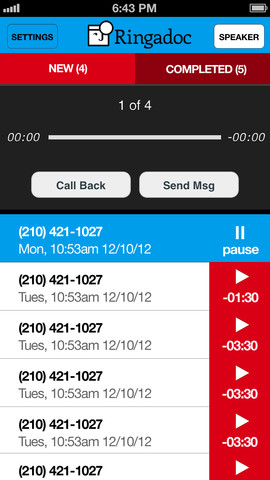 This week San Francisco-based Ringadoc announced an additional $450,000 in funding, which combined with its $750,000 from last year brings its total seed round funding to $1.2 million. The round was led by Founders Fund's FF Angel and includes contributions from Practice Fusion CEO Ryan Howard but the additional funding comes from angel investor Sharon Knight, former president of concierge-style health provider One Medical Group, and other undisclosed angels. Ringadoc plans to use the funds to scale its new offering Ringadoc exchange, develop new patient-facing apps, and to develop a premium service offering that could add video conferencing capabilities to the current voice-only communications offering.
This week San Francisco-based Ringadoc announced an additional $450,000 in funding, which combined with its $750,000 from last year brings its total seed round funding to $1.2 million. The round was led by Founders Fund's FF Angel and includes contributions from Practice Fusion CEO Ryan Howard but the additional funding comes from angel investor Sharon Knight, former president of concierge-style health provider One Medical Group, and other undisclosed angels. Ringadoc plans to use the funds to scale its new offering Ringadoc exchange, develop new patient-facing apps, and to develop a premium service offering that could add video conferencing capabilities to the current voice-only communications offering.
Apart from the $750,000 funding raise last summer, the last we heard of Ringadoc was in November 2011 when we reported on its first patient facing app launch, which enabled patients to record video messages ahead of a virtual visit with a new physician. Ringadoc CEO Jordan Michaels told MobiHealthNews that the company has dropped the video-enabled offering for now -- they currently have no patient-facing apps, actually -- and have re-focused on improving after hour phone consultations for patients and physicians, alike.
Patients who already have a physician likely have to deal with an annoying 1970s call center system to get a hold of them after hours, Michaels said. Patients who don't have a physician could also use a service that might help them decide whether they should go to the emergency room or the urgent care center -- or, perhaps, whether the issue could be handled over the phone.
"Initially we developed a direct to consumer play where patients could go to a bank of doctors that we curated in California to pay for an on demand consultation with a doctor," Michaels said. "That is still available and still being piloted in California, but we quickly learned from that those doctors that they wanted to use the same technology with their own patients for after hour calls -- not just to attract new patients."
Michaels describes Ringadoc's evolving platform as a "one stop shop" for after hour calls and practice management. While the on demand pilot see patients paying about $40 per visit, the new Ringadoc Exchange offering costs doctors $50 a month. Ringadoc will use some of its new funds to build out additional premium services like video conferencing and text messaging to help physicians make additional, incremental revenue from their after hours calls.
The company believes enabling a better after hours calling experience will help doctors ensure that the patients that come to visit them in person are the ones that really need to be there and aren't there because there's no alternative way to reach them. Michaels said that doctors receive between 200 and 250 after hours calls a month and about 10 percent of those request to speak with a doctor. Telephonic visit reimbursement is not available right now, but Michaels noted that a bill is pending in California.
Ringadoc believes physicians could treat patients over the phone for routine diagnoses like sinus infections or urinary tract infections -- something that the patient might get two or three times a year and doesn't need to necessarily go in for. Ideally, this could help reserve in-person visits for those patients who have more serious, less routine issues, which, of course, generally have a higher reimbursement rate per visit.
When doctors receive an after hours call via Ringadoc Exchange they receive a message in their Exchange inbox, which can be accessed a number of ways including via a new iPhone or Android app that the company launched in tandem with this recent funding announcement. Michaels said the goal was to provide physicians with the flexibility to manage their patients after hours with as much ease as they would their Netflix qeue or Amazon Prime account.
While Ringadoc is based out of Practice Fusion's offices in San Francisco and has that company's CEO as an advisor and investor, it has no formal partnership with the company. Ringadoc, however, could find a lot of points of integration with EHR providers and others working in the practice management space. There is also an opportunity for Ringadoc to partner with those aggregating doctors online -- sites like ZocDoc could offer telephone or (in the near future video) consultations with some of the physicians it has on its online appointment booking site.
"We really want to be the backbone of all out-of-office patient-physician communication," Michaels said.













